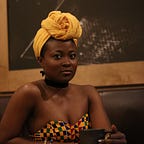Straddling Two Worlds
Bi-cultural.Multi-ethnic. These are words that I come across daily in my psychological and leisurely reading. They are used to describe a person who grew up or has been socialized in more than one society or ethnic group. These words are slowly becoming my identifiers. Gradually, I am watching myself become bi-cultural, multi-ethnic. I have also come to realize that these words do not reveal the struggles and pains behind the transition, the relationships lost and the human egos that are bruised by this socialization. Sometimes we also don’t talk about the discomfort that can come from fitting these labels, and frankly, I am sick of pretending that being bi-cultural and multi-ethnic is all fun and games.
I am from Ghana and I have lived in the U.S. for quite a while. I have acquired a slight Mid-Western accent, enjoy American traditions and swear by Bath and Body Works. When I go to Ghana, I can fit in quite easily, and when I am here, I can fit into a small group of people. However, I don’t fit perfectly in either worlds. I am literally straddling two worlds, whereby one foot is in each, but I cannot seem to firmly stand in either. This struggle, the constant awkwardness of being, elicits a type of acculturative stress that we hardly discuss. As much as I have two feet in different places, I am constantly trying to acculturate, to adjust to the ways of life in each place without losing my footing in either. Even writing about it causes me some stress.
When I am in Ghana, I am Ghanaian but not really. I am a Ghanaian who is able to speak English perfectly well with a foreign accent. I am a Ghanaian educated abroad, able to speak on “abroad” issues and living. I am a Ghanaian who speaks my native language with the slightest hint of an accent, often replacing forgotten Fanti words with English ones. When I am back home, I have to move around with a friend or relative who lives in the country, so I am not duped by taxi drivers and vendors. Even if I want to travel alone, I cannot because I am no longer familiar with the city. Cities do not wait for their traveled children to return before they switch up. They do not ask our permission before constructing new roads, remodeling famous landmarks or renaming once-familiar streets. Cities simply move on, whether you are present or unavailable.
When I am in the U.S., I am a Black immigrant woman, a triple minority. I move silently through spaces, masking and thinning myself so I don’t draw too much attention. People judge my accented English and tell me crap like “Oh you speak English so well for an African! Where did you learn to speak like that?”. People have the nerve to say to me “I am so glad we met and can be friends, I have always wanted a Black friend!”. In the U.S, I am just another Black woman in a sea of White faces. I could get stopped by the police at any time for “fitting the profile” if a crime happens in my neighborhood. I do not stand out too much, but I also do not quite blend in seamlessly. When I am in America, I am Ghanaian. Very outwardly Ghanaian. The type who has a flag in her apartment, coupled with artwork of African women and scenery. It’s like a constant tug of war, where I am not American enough, but I am also quite American. I understand the four seasons, the jargons, the educational system, and the foods. However, because I am multi-lingual and bi-cultural, I do not quite fit into the scheme of who should be in America. As much as I would like to talk about this with others, I find that I restrain myself because I worry about coming off as ungrateful. I recognize the privilege of growing up in one country and living in another. I know that being bi-cultural is not a right, neither is it an experience that everyone gets. Therefore, talking about the challenges of bi-culturalism can come off as complaining and being ungrateful, and frankly, who wants to deal with that?
The challenges of bi-culturalism are often discussed in academic research and discussions, making it highly intellectual and inaccessible to lay people. Unfortunately, it is lay people who experience these challenges. I am fortunate enough to have the language for my experiences because I am a researcher. In writing about it, I hope to start the conversation about the gray and uncomfortable areas of bi-culturalism, and to shed light on the many people who have each foot in a different reality without being able to plant themselves firmly in either.
